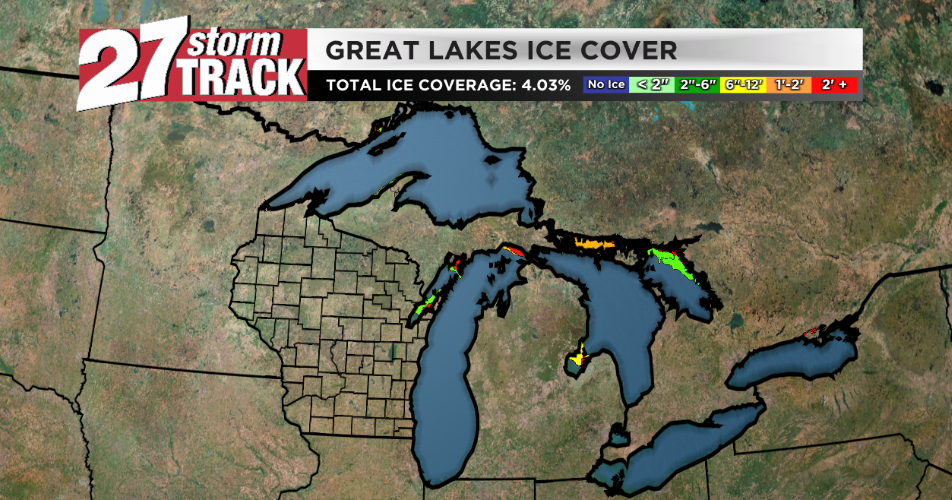
MADISON (WKOW) - According to the Great Lakes Environmental Research Laboratory (GLERL), they haven't had ice levels this low since they began keeping records back in 1973.
When looking at current data from GLERL, the current accumulative ice coverage for all the Great Lakes is 4% at a time when ice coverage across the lakes has been, historically, at its peak.
Despite the cold spell that occurred in January, the colder air did not sit over the Midwest long enough for suitable ice formation. Which comes after a warm start to the 23/24 winter season for the Midwest.
According to Climate Central, winter is the Midwest's fastest warming season with many cities across parts of Wisconsin, Illinois, Michigan, Indiana and Minnesota recording more very warm days and less cold days.
When looking at the average temperature from December through January, it's the second warmest for the Upper Midwest Region (Michigan, Minnesota, Iowa and Wisconsin) with an average temperature of 26.2°F. That's 10.3°F above the 1901-2000 normal.
Prolonged periods of cold air is essential for ice formation, along with less windy conditions. Once ice does form, ice continues to extend below the surface as heat escapes from the water below through the column of ice. Prolonged periods of cold air allows for the greatest loss of heat from the body of water with peak growth occurring once air temperatures are at or below 10°F.
Other factors like snow cover on the ice also affect how quickly heat escapes. More snow on the ice means less heat can escape from body of water.
The low ice coverage is being recorded on all of the Great Lakes; Lake Superior, Lake Michigan and Lake Huron's current ice coverage is historically low while Lake Ontario's and Lake Erie's coverage is joining previous years very low ice coverage.
Individually, all of the Great Lakes are below the historic average as outlined by GLERL. When looking at the cumulative ice coverage, 2023/2024's cumulative ice coverage is not only below the historical average but below previously, historically low years as well.
While low ice coverage isn't unusual during the start of the Winter season, ice coverage across the Great Lakes has been decreasing. GLERL notes that since records began in 1973, ice coverage has been decreasing at roughly 5% per decade.
Climate Central has found that specifically for Lake Michigan, the percentage of the lake coverage by ice is approaching only 30%. Down from nearly 50% back in 1973. Cumulative ice coverage for all the Great Lakes has dropped from just over 60% in 1973 to nearly 40% in 2023.
The freezing of lakes, like the Great Lakes, is incredibly important to not only the surrounding economies but also the aquatic ecosystems below the surface.
Some species of freshwater fish's biological processes, like spawning, revolve around the seasonal temperature changes. Less cold days will affect these fish. Warmer bodies of water will allow for growth of algae and aquatic plants which also require oxygen from the water, leading to competition among fish for oxygen. Invasive species that thrive in warmer waters may also start appearing as waters don't cool as much or stay cooler for longer.
Lakes deeper than 20 feet will also struggle to "flip" which occurs twice a year, Spring and Fall. The "flipping" of the lake occurs when water densities at the surface and the bottom of the lake become more equal then "flip" as temperatures either continue to warm or cool.
The turnover of the lake allows from nutrients to flow more freely throughout the lake or body of water. With more oxygen at the top layer of the lake, the turnover also brings more oxygen to the bottom of the lake helping sustain the habitat the bottom of the lake.
"low" - Google News
February 16, 2024 at 12:55AM
https://ift.tt/v1O9Jl2
Great Lakes ice coverage reaches historic low | Environment | wkow.com - WKOW
"low" - Google News
https://ift.tt/EMDHbXB
Bagikan Berita Ini














0 Response to "Great Lakes ice coverage reaches historic low | Environment | wkow.com - WKOW"
Post a Comment